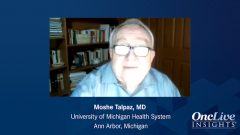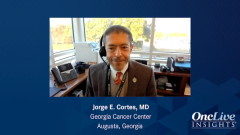
Chronic Myeloid Leukemia: Asciminib’s Toxicity Profile
A brief review of asciminib’s toxicity profile and how to best manage adverse events in patients with chronic myeloid leukemia.
Episodes in this series

Transcript:
Daniel J. DeAngelo, MD, PhD: Concerning the toxicity for asciminib, the dose-limiting toxicity in
a phase 1 study was a rise in the lipase. Lipasemia is usually asymptomatic. This has to do with potent ABL1 inhibition. It’s a class effect of all the agents, but it seemed to be a little higher in the asciminib, so that’s something I would follow. Other toxicities, including mild diarrhea and mild nausea, were very well controlled. Although I have a lot of experience using asciminib, it’s still an anecdotal response from my perspective. I find it to be a very well-tolerated agent and a welcome addition to the armamentarium for our patients with chronic-phase or stable-phase CML [chronic myeloid leukemia].
Moshe Talpaz, MD: The adverse effects were moderate and acceptable overall. These adverse effects included 1 patient that I had to take off the study because his pancreatic enzymes were elevated, even though he’d never had any overt signs of pancreatitis. But the study guided us to take this patient off-study, and we had to comply. The second patient has a known history of pancreatic problems, so we had to lower the dosage to up to 20 mg once a day. The patient was able to maintain a quality remission for a significant period. Eventually, the pancreatic enzyme elevation was such that we had to take them off the study. One patient had an unusual reaction at the beginning of the study, with a sense of fainting and abnormal electrolytes. Interestingly, those have resolved the patient was able to continue treatment for more than 2 years since that event and is in complete molecular remission to our satisfaction.
Other patients have virtually no adverse effects, whatsoever. The collective impression of the adverse effects is they’re moderate to mild in intensity. In most of patients, the drug is well tolerated. Most patients are exceedingly happy with this drug. You can imagine when patients who’ve never responded to anything are getting this drug and have the gratifying and beautiful response, they’re extremely grateful.
By the way, I should mention another interesting element. In my experience, at least 2 patients couldn’t tolerate any drug in the past. I don’t know whether this was real intolerance or whether the patients’ complain of nausea and vomiting with whatever drugs they use. Both of them are on asciminib. They do extremely well, both with at least a major molecular response. In a nutshell, that’s my very positive experience with asciminib.
Transcript edited for clarity.







































